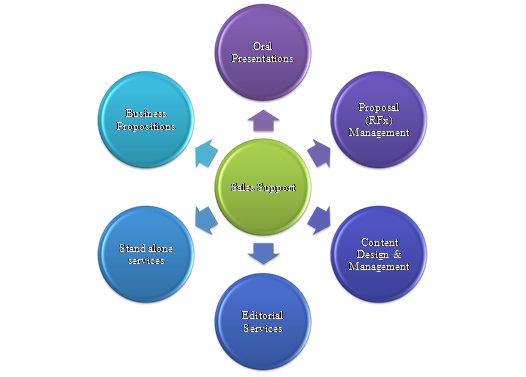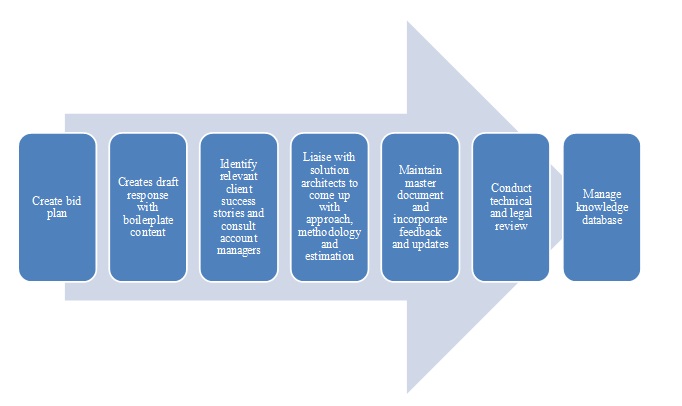- Articles ›
- Operations and IT ›
- Sales Support – Backbone of the Sales Lifecycle Articles
Sales Support – Backbone of the Sales Lifecycle
Often companies hire sales support personnel to back client-facing executives who are responsible for closing a sale with a customer. Taking the final call on pricing on a particular deal and handling customer relationship is the main area of focus for a sales personnel. Product demonstrations and creating proof of concepts for the customer such that the solution sold is relevant, effective, is the right-fit and complete, is the main job of a pre sales personnel.

image:freedigitalphotos.net
So, where does sales support fit in the entire scheme of things within an organization?
A remarkable dialogue of Col. Jessep from the legendary movie Few Good Men, “I have neither the time nor the inclination to explain myself to a man who rises and sleeps under the blanket of the very freedom that I provide, and then questions the manner in which I provide it” somewhat resembles the typical duty of a sales support personnel, if I may be allowed to quote.

Figure: Sales Support Functional Units
Sales Support, as rightly mentioned is the backbone of the sales lifecycle. In a representative B2B scenraio, it is the first stage of the sales cycle that encompasses bid management and churning out high volumes of bid responses for the end customer. In the services sector, they are often responsible for supporting the customer facing executives to respond to client requests in terms of RFPs and RFIs. The figure above highlights the fucntional units of a typical sales support process.
Typical Responsibilities of Sales Support Personnel
A sales support personnel is ideally responsible to develop client-specific sales collateral, capability decks and proposal content that ensures centralization and accuracy of facts and figures that provide ‘One Version of the Truth’. Majority of the time, they involve themselves in liasing with solution architects and capability leaders to understand the client requirements and devise a solution approach, win theme and value proposition that best fits the client requirements.

Figure: Typical Responsibilities of Sales Support Personnel
- Proposal Writing: Deemed as the main responsibility of a sales support personnel and this requires a consistent voice across chapters and volumes as if written by a single author. A sales support personnel should be able to provide enhancements ranging from style and readability enhancement to noteworthy content creation. It is an advantage if you can know how to format documents or convert content in different formats and create images.
- Be the voice: One is expected to be on calls with client facing executives and end clients on the job at all times. It also includes site visits and interfacing with key client sponsors and decision makers. Be the spokesperson for your team, understand the expectations of your stakeholders and design innovative solutions for your customer. Communication is going to be the single most important trait of business leaders in times to come. Clients have become less loyal due to the ever increasing basket of choice available to them and to retain them is only possible by gaining their confidence and trust, and the only way to do this is by effectively communicating their importance.
- Business Relevance: This aspect is especially crucial because the products and services are often heavily customizable and also because the needs of different customers are often distinctive. For example, the main drivers for adoption of core banking solutions by banking clients are either modernization of processes and applications, focused customer-centricity, using data analytics to get more complete view of the customer, multichannel options like ATM, mobile, internet, or reducing implementation time of systems in the premises of banks. In this scenario, we need to see what the customer actually wants and then alter our solution for the client accordingly.
- Harvest Knowledge: It is rightly said that CUSTOMER is king! And we are not looking at only our customers, but at customer’s customers. It all boils down to how I make sure I know my customer. You need to research your customer, their requirements, environment, interests and pain points, product portfolio, competitors, sales strategy and many more salient points. Understand that customer feedback is very essential. For example, one can derive insights from customers by using marketing research studies such as Usage & Attitude studies, Brand Health studies, Focus Group Discussions and In-depth interviews to analyze factors that influence consumer behaviour and consumption patterns and to conducting competitor and market analysis.
- Flexibility: Walter Vierra’s ‘Now that I’m a sales manager’ taught me a very important point about the sales process – always to be abreast of new changes in environment and adapt accordingly. We cannot be too rigid in our thinking and need to be flexible in our decision making. Companies struggle to remain afloat in the constantly changing and dynamic market place and it is often a rigid and stubborn thought process that lands companies in a soup.
- Technically sound: Working in a Sales Support role requires a deep understanding of various technical aspects to be able to provide accurate and timely support to the front end sales team. To keep one abreast of the technology advancements, certifications and training courses form a critical part of a sales support specialist life. This technical understanding of the company’s products and services can show real expertise on the solutions one sells. This gives trust to the people who need to decide if they have to choose between your company and others.
So what does it take to be a Sales Support Specialist?
- Effective time management skills: ‘Time is of essense’. This is a statement that is often seen in many contracts and RFPs. While this may be written in context of the project at hand, it is the most important skill of a Sales Support Specialist. Managing your time dealing with various RFPs and RFIs that could turn up simultaneously is no child’s play. It requires a skill that an MBA course teaches students due to the hectic schedule and if you manage to survive your MBA, it could be a great skill to have.
- Leadership skills: People always believe that leadership can only be from within, either you have it or you don't. Well, I for a change believe leadership can be taught and inculcated in oneself. It also forms a very important part of the sales process. Leadership and ownership are very critical in a sales process. They decide the fate of many a sales person. And it is no different for a sales support personnel. It is very important to show leadership in times of crisis and more importantly to take ownership of the project that is assigned to an individual. Every organization looks for employees that possess these skills.
- Exceed one’s own expectations: I believe one must deliver only when one feels he or she has done justice to one’s work. I used to never deliver just to impress. I ensured that I was able to defend my position if I was held responsible for my area of work or my team’s area of work. It is when I exceed my own expectations, will I be able to exceed client expectations. Very often we tend to perform as per our targets and appraisals and that is where we fail to understand our potential. We often hear of individuals who move on to more challenging roles because they believe their current role is not challenging enough. Well a good question to ask yourself is, “Whose fault is that?” We are the best judge of our capabilities and we should set benchmarks and targets that challenge us.
Building a strong foundation for oneself: If not now, then when? Build your base with achievements that hold value for you as an individual, that motivate you to perform better with every opportunity you find. At the end of the day, it is your personal brand identity that sells. Clients return to work with people and not with companies. It is the people in a company that give it the identity and perception that clients look for.
This article has been authored by Amritha Chhotakurien from SP Jain School of Global Management.
Views expressed in the article are personal. The articles are for educational & academic purpose only, and have been uploaded by the MBA Skool Team.
If you are interested in writing articles for us, Submit Here
Share this Page on:
What is MBA Skool?About Us
MBA Skool is a Knowledge Resource for Management Students, Aspirants & Professionals.
Business Courses
Quizzes & Skills
Quizzes test your expertise in business and Skill tests evaluate your management traits
All Business Sections
Write for Us